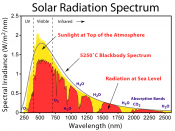The greenhouse effect, in environmental science, is a popular term for the
effect that certain variable constituents of the Earth's lower atmosphere have on
surface temperatures. These gases--water vapor (H2O), carbon dioxide (CO2), and
methane (CH4)--keep ground temperatures at a global average of about 15 degrees
C (60 degrees F). Without them the average would be below the freezing point of
H20. The gases have this effect because as incoming solar radiation strikes the
surface, the surface gives off infrared radiation, or heat, that the gases trap and
keep near ground level. The effect is comparable to the way in which a greenhouse
traps heat, hence the term.
Environmental scientists are concerned that changes in the variable contents
of the atmosphere (particularly changes caused by human activities) could cause the
Earth's surface to warm up to a dangerous degree. Even a limited rise in average
surface temperature might lead to at least partial melting of the polar ice caps and
hence a major rise in sea level, along with other severe environmental agitation.
An
example of a runaway greenhouse effect is Earth's near-twin planetary neighbor
Venus. Because of Venus's thick CO2 atmosphere, the planet's cloud-covered
surface is hot enough to melt lead.
Water vapor is an important 'greenhouse' gas. It is a major reason why
humid regions experience less cooling at night than do dry regions. However,
variations in the atmosphere's CO2 content are what have played a major role
in past climatic changes. In recent decades there has been a global increase in
atmospheric CO2, largely as a result of the burning of fossil fuels. If the many
other determinants of the Earth's present global climate remain more or less
constant, the CO2 increase should raise the average temperature at the Earth's
surface. As the atmosphere warmed, the amount...


